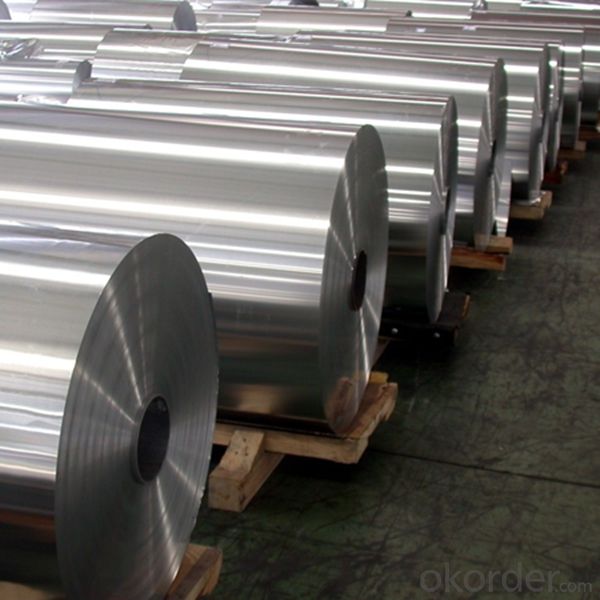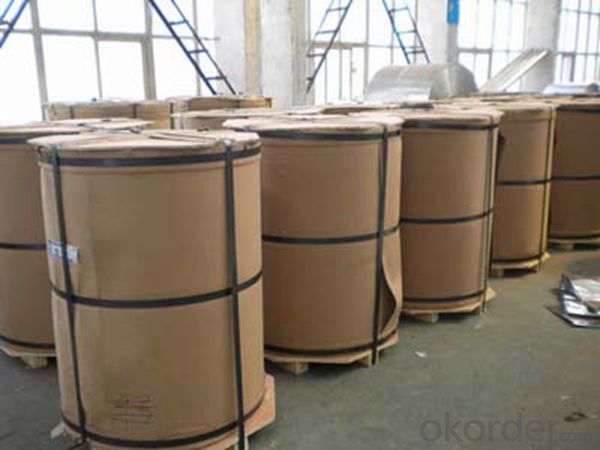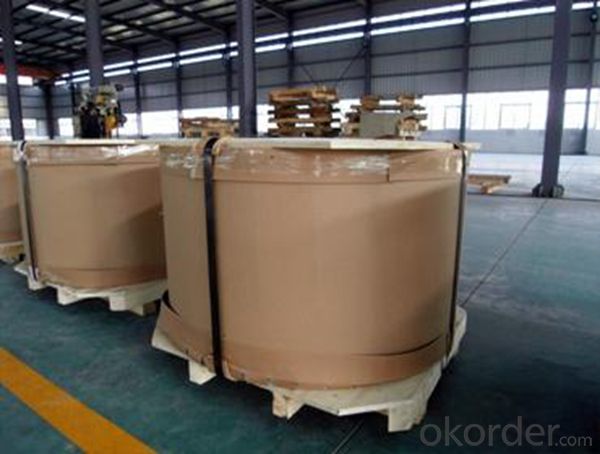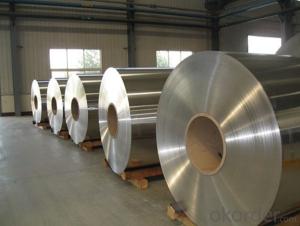Hot Rolled Aluminium Coil AA1100 for Building
- Loading Port:
- Shanghai
- Payment Terms:
- TT OR LC
- Min Order Qty:
- 5 m.t.
- Supply Capability:
- 10000 m.t./month
OKorder Service Pledge
OKorder Financial Service
You Might Also Like
Item specifice
1. Specification of Factory Supply Hot Rolled Aluminium Coil AA1100 for Building
characteristics | Application |
1) Super peeling strength | 1) Building exterior curtain walls |
2) Excellent surface flatness and smoothness | 2) Decoration and renovation additions for old buildings |
3) Superior weather, corrosion, pollutant resistance | 3) Decoration of interior walls, ceilings, bathrooms, kitchens and balconies |
4) Even coating, various colors | 4) Shop door decorations |
5) Fireproof, excellent heat and sound insulation | 5) Advertisement board display platforms and signboards |
6) Superior impact resistance | 6) Wallboards and ceilings for tunnels |
7) Lightweight and easy to process | 7) Industrial materials, materials for vehicles and boats |
2. Application of Factory Supply Hot Rolled Aluminium Coil AA1100 for Building
(1).Interior: wall cladding, ceilings, bathrooms, kitchens and balconies, shutters, doors...
(2).Exterior: wall cladding, facades, roofing, canopies, tunnels, column covers , renovations...
(3).Advertisement: display platforms, signboards, fascia, shop fronts...
3. Feature of Factory Supply Hot Rolled Aluminium Coil AA1100 for Building
• Our goods quality is top, the surface is smooth, and every steel coil
• No Joint, No Bends, no spots, no roller marks.
• MTC will be provided with goods, third part inspection is acceptable, for example, SGS, BV. Etc
Be free from Oil Stain, Dent, Inclusion, Scratches, Stain, Oxide Dicoloration, Breaks, Corrosion, Roll Marks, Dirt Streaks and other defect which will interfere with use
4. Certificate:
SGS and ROHS(if client request, paid by client), MTC(plant provided), Certificate of Origin(FORM A, FORM E, CO), Bureau Veritas and SGS (if client request, paid by client), CIQS certificate
5. Image of Factory Supply Hot Rolled Aluminium Coil AA1100 for Building



6. Package and shipping of Factory Supply Hot Rolled Aluminium Coil AA1100 for Building
eye to wall
eye to the wall
with wood pallet (wooded case also available)
7. FAQ
1) What is the delivery time?
Dpends on actual order, around 20 to 35 days
2)What is the QC system:
We have QC staff of 20 persons and advanced equipment, each production is with MTC traced from Aluminum ingot lot.
3) What market do you mainly sell to?
Australia, America, Asia, Middle East, Western Europe, Africa etc
- Q:How are aluminum coils used in the production of furniture?
- Due to their advantageous properties, aluminum coils find wide application in furniture production. Typically composed of high-quality aluminum alloy, these coils possess excellent corrosion resistance, durability, and lightweight characteristics. When it comes to furniture manufacturing, aluminum coils are primarily employed in constructing the framework or structure of the furniture pieces. These coils are often shaped and formed into various profiles to provide the necessary strength and rigidity for the furniture item. Additionally, the coils can be effortlessly bent, cut, and joined together, allowing for the creation of different components such as chair frames, table legs, or cabinet structures. This versatility enables manufacturers to design and produce furniture with intricate and customized shapes and sizes. Furthermore, aluminum coils are highly adaptable to various finishing techniques. They can undergo anodization, painting, or powder coating to enhance their aesthetic appeal and offer additional protection against wear and tear. As a result, furniture made with aluminum coils is resistant to scratches, stains, and fading, ensuring longevity and an appealing appearance. Moreover, aluminum coils provide a lightweight alternative to materials like steel or wood, making furniture easier to transport and handle. This is particularly advantageous for outdoor furniture or pieces that require frequent movement or rearrangement. In addition, aluminum is an environmentally friendly and sustainable material. It is fully recyclable, allowing manufacturers to reduce their carbon footprint and contribute to a more sustainable production process. In conclusion, the inclusion of aluminum coils in furniture production is crucial, as they offer strength, durability, versatility, and aesthetic appeal. Their usage in furniture manufacturing enables the creation of lightweight, customizable, and sustainable furniture pieces that meet the demands of modern consumers.
- Q:Can aluminum coils be used in the production of household appliances?
- Household appliances can indeed utilize aluminum coils in their production. Aluminum, a material known for its lightweight and durable nature, boasts exceptional thermal conductivity, rendering it highly suitable for various appliance applications. Refrigerators, air conditioners, and heat pumps, for instance, greatly benefit from the utilization of aluminum coils. These coils are commonly employed in the condenser and evaporator coils of such appliances, efficiently facilitating heat transfer. Moreover, the corrosion resistance of aluminum coils is pivotal in ensuring the longevity and optimal performance of household appliances. Consequently, owing to their advantageous properties and benefits, aluminum coils remain a favored option in the production of household appliances.
- Q:The canoe is aluminum. It has some paint remaining on it from what i am assuming is the original factory paint. The paint is just in patches, so my question is do i sand only where the paint is, or the whole canoe? Will sanding the aluminum damage it? Or should I not sand it at all, and just use paint stripper? After getting the old paint off, what kind of primer should i use? or is it not necessary to prime? What kind of paint should I use? I plan on it being multi tone(a leafy camo, of olive drab, flat black, and a gray tone).
- Go to a paint trade shop tell them what your trying to achieve. They will probably suggest a primer to etch the aluminium. Once its been etched you can paint it any colour you wish. If you don't etch the aluminium, the paint will probably fall off. The etching gives the paint something to adhere to. Cheers!!
- Q:I have a 94 Gt Mustang that has had a little work done to it so far. The boy I bought it from had an aftermarket cam put in it, had the heads ported and polished. He also had the heads shaved a little. My question is.........Would having aluminum heads with roller rocker arms installed help it enough to justify doing it. If it would, how Much would it help? I am not exactly sure how much life and duration my cam is running, but it idle pretty rough. I believe my compression is about 9.5 to 1.
- racing okorder /... they have part specifically designed for improving performance on your Mustang. mixing a variaty of parts from defferent manufactures does not always increase performance. cams, heads, lifter, rockers, fuel system components need to be match for the type of performance increase you are looking for and at fordracing these parts are matched into different performance improvement types. Check out the web site it will get you started in the right direction for what you are looking for.
- Q:Why does the heat preservation aluminum roll bend when it is cooled?
- [insulation aluminum] is actually aluminum sheet, commonly known as aluminum coil. When delivered, it can be flat or curly.
- Q:Are aluminum coils resistant to oil and grease?
- Aluminum coils typically possess resistance against oil and grease. They exhibit a natural ability to resist corrosion and are not easily influenced by most solvents, including oil and grease. This characteristic renders aluminum coils a suitable option for diverse applications that involve potential contact with oils or greases, such as the automotive and HVAC sectors. Nevertheless, it is crucial to acknowledge that extended exposure to particular aggressive chemicals or high concentrations of oil or grease may gradually result in damage or deterioration of the aluminum coils. Consequently, it is advisable to diligently clean and maintain the coils to guarantee their optimal functioning and durability.
- Q:What are cold rolled aluminum coils and hot rolled aluminium coils, what are their respective features?
- The difference between hot rolling and cold rolling is that cold rolling is rolled at recrystallization temperature and hot rolling is above the recrystallization temperature.
- Q:How are aluminum coils used in the production of food processing equipment?
- Aluminum coils are widely used in the production of food processing equipment due to their desirable characteristics and benefits. These coils are typically made from high-quality aluminum alloy, which offers excellent heat conductivity, corrosion resistance, and durability. One primary application of aluminum coils in the food processing industry is in the construction of heat exchangers. These heat exchangers are essential components of various food processing equipment, such as ovens, fryers, and refrigeration systems. The aluminum coils within the heat exchangers facilitate the transfer of heat between different mediums, ensuring efficient and precise temperature control during food processing. Another important use of aluminum coils is in the manufacturing of evaporator coils. These coils are integral to refrigeration systems used in commercial food processing. The evaporator coils, made from aluminum, aid in the cooling process by absorbing heat from the surrounding environment and allowing refrigerants to evaporate, thereby maintaining low temperatures within the equipment. Additionally, aluminum coils find application in the construction of food storage and transportation equipment, such as refrigerated trucks and containers. Aluminum's lightweight nature contributes to fuel efficiency and enables easier transportation of food products while maintaining their quality and freshness. Furthermore, aluminum coils are valued for their hygienic properties and ease of cleaning, making them ideal for food processing equipment. Aluminum surfaces can be easily sanitized, ensuring a high level of cleanliness and preventing contamination during food production. Overall, aluminum coils play a crucial role in the production of food processing equipment by providing excellent heat transfer, corrosion resistance, durability, and hygienic qualities. Their usage helps ensure efficient food processing operations, optimal temperature control, and the maintenance of food quality and safety standards.
- Q:Are aluminum coils suitable for gutter systems?
- Yes, aluminum coils are suitable for gutter systems. Aluminum is a popular choice for gutter systems due to its durability, lightweight nature, and resistance to rust and corrosion. It is a cost-effective option that can withstand harsh weather conditions and has a long lifespan. Additionally, aluminum coils are easy to install and maintain, making them an ideal choice for gutter systems.
- Q:How are aluminum coils tested for thickness and flatness?
- Various methods are employed to test aluminum coils for thickness and flatness, ensuring they meet the necessary specifications. One commonly used method is non-destructive eddy current testing. This involves passing an alternating current through the coil and measuring the changes in the magnetic field caused by the eddy currents induced in the aluminum. By analyzing these changes, the thickness of the coil can be determined. Ultrasonic testing is also utilized to measure the thickness of aluminum coils. This method involves sending ultrasonic waves through the coil and measuring the time it takes for the waves to bounce back. It is highly accurate and capable of identifying any variations in thickness throughout the entire coil. To assess the flatness of aluminum coils, a straight edge or laser beam is often employed. The coil is placed on a flat surface, and the straight edge or laser beam is positioned across its surface. Any deviations from perfect flatness can be easily identified by observing the gaps or irregularities between the coil and the straight edge or laser beam. For a more comprehensive analysis of flatness, advanced technologies like laser profilometry can be used. This involves creating a three-dimensional map of the coil's surface, providing highly detailed information about any variations in flatness across its surface. In conclusion, aluminum coils are subjected to rigorous testing procedures to ensure they meet the necessary standards for thickness and flatness. These tests are essential in maintaining the quality and reliability of aluminum coils, particularly in applications where precision and consistency are crucial.
1. Manufacturer Overview |
|
|---|---|
| Location | |
| Year Established | |
| Annual Output Value | |
| Main Markets | |
| Company Certifications | |
2. Manufacturer Certificates |
|
|---|---|
| a) Certification Name | |
| Range | |
| Reference | |
| Validity Period | |
3. Manufacturer Capability |
|
|---|---|
| a)Trade Capacity | |
| Nearest Port | |
| Export Percentage | |
| No.of Employees in Trade Department | |
| Language Spoken: | |
| b)Factory Information | |
| Factory Size: | |
| No. of Production Lines | |
| Contract Manufacturing | |
| Product Price Range | |
Send your message to us
Hot Rolled Aluminium Coil AA1100 for Building
- Loading Port:
- Shanghai
- Payment Terms:
- TT OR LC
- Min Order Qty:
- 5 m.t.
- Supply Capability:
- 10000 m.t./month
OKorder Service Pledge
OKorder Financial Service
Similar products
New products
Hot products
Related keywords





























